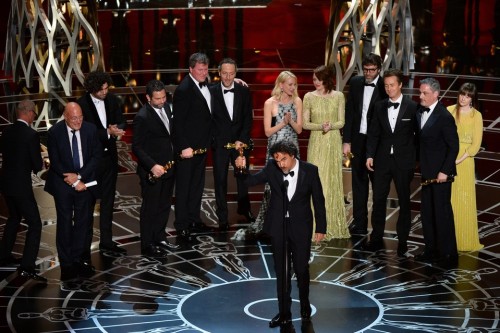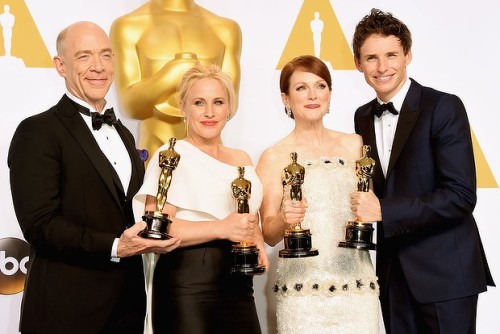Travis: Well, that happened.
The 2015 Academy Awards Ceremony was last night, and Birdman cleaned up, winning awards for Best Picture, Director, Original Screenplay, and Cinematography. Alex, I know you’re feeling…well, feelings about this. Talk me through what you’re going through right now. And remember, you’re in a safe space. Don’t hold back.
Alex: So, I did not like Birdman. This should be fairly obvious if you’ve followed me on here or social media in the past two months. I’m hesitant to hash out all my problems with it again, so I’ll just link to Todd VanDerWerff ripping it down last night. He makes the (correct) case that it’s an Emperor Has No Clothes situation. The movie’s narrative is built around reassuring Hollywood that all of its narcissism and vanity are not only worthwhile vices, but actually noble character traits. It’s like Robert Altman making The Player as a tribute to movie executives or Billy Wilder conceiving Sunset Boulevard as a moving endorsement of actors’ inherent vanity. Birdman’s core ethos are fucking ugly and disingenuous and its win is part of a really nasty trend from the Oscars.
With Birdman this year, Argo in 2012, and The Artist in 2011 there has been a lot of self-congratulation coming from the Oscars these past few years. And the Oscars themselves are already self-congratulatory! It’s not that a winning movie about artists or entertainment is inherently bad. Amadeus is one of my favorite Best Picture winners and I will stand by Shakespeare in Love besting Saving Private Ryan. But those films, and others about art and artists, usually touched on bigger and more universal themes like insecurity or romantic longing. What’s more, the Academy usually had the sense not to laud themselves. Movies about movies didn’t start to win Oscars until very recently, and suddenly that is almost the only thing winning. I’ve got a theory about why that is and what it has to do with some larger cultural trends, but I’ll save it for later.
How did the night fare for you?
Travis: Frankly, it wasn’t all bad. Whiplash and The Grand Budapest Hotel each got recognition – and those awarded lauded their directors, who are two of the best visionaries working in film today. While Boyhood was cruelly under rewarded, Patricia Arquette winning felt pretty good – 12 years is a long time to dedicate to a film, so when it not only works but works well, that should be rewarded. And “Glory” winning for John Legend and Common (and really for Selma as a whole) was amazing – it deserved every bit of its standing ovation.
That leads me to what I did AND didn’t like about the show – a lot of recipients of Oscar gold used their speeches to stump for personal causes. This ranged from suicide prevention to racial injustice, from wage equality to ALS and Alzheimer’s awareness. Innaritu actually managed to turn around a highly insensitive “inside joke” (I don’t buy that for a second) by Sean Penn by stumping for immigration rights and for quality Mexican government.
I like when important causes are brought to national attention, especially during a telecast where many who tune in are just expecting entertainment. (That’s the social activist in me – just because you’re watching an awards show doesn’t mean you get to tune out real life) However, I don’t like it when it’s rolled on as a non-stop parade of causes. This can cause many I know who need to listen to what’s being said to tune everything out, pushing it off as the “liberal elite” standing on soapboxes and preaching to their crowd. It’s not misguided – I just feel it’s like pounding a nail in with a sledge hammer. One time works fine – after that, it’s redundant.
What did you take away from the night? What positives were there for you? Tell me more about your cultural theory, since we’re talking about culture here.
Alex: As to your last point, quickly, I think it’s understandable why these winners would stump for their causes. But what both those winners and the show itself seem to forget is that their movies made that point for them already. Often made it better, in fact.
So, yeah, my theory about these recent insular Oscar winners is that its a symptom of a fragmenting audience and collapsing cultural consensus. In the mass media era that the Oscars were created in absolutely everyone went to the movies all the time. That changed with the rise of TV and even more the past few decades with the rise of digital media. While the annual box office takes has grown due to ticket price inflation, actual attendance is way down decade upon decade. Long story short, the movie industry is losing its relevance and knows it. The box office total finally fell this year, but that was hardly the canary in the coal mine. Better and more interesting work in comedy and drama is often done on TV. The rise of streaming video has made getting people into theaters harder than ever. Superhero fatigue is finally setting in. So what does Hollywood do? Cling to themselves, because the future is too scary. Say that their past was glorious (The Artist), and that they can change the world (Argo), and their work is the most noble endeavor possible (Birdman). All those thoughts are of the same insecure impulse, but I find the last one particularly noxious. 2014 saw a lot of controversial momentum about visibility, representation, and power for people who were not entitled straight rich white dudes. But that crowd’s grip on power is strong and they won’t cede the spotlight quietly. Despite Birdman being (somewhat) formally faring I still count it as a victory for cultural revanchists.
Oh, also, there were some positives. The Grand Budapest Hotel and Whiplash both did really well. The former swept up four technical awards, all of which I think were richly deserved. That Wes Anderson didn’t win one himself was brutally disappointing to me, especially since he lost to fucking Innaritu. But, still! That’s four more Oscars for Wes Anderson movies than ever before. Hopefully it sets him up for a future win. The latter’s assured win for J.K. Simmons and surprise wins for Sound Mixing and Film Editing were wonderful. Again, it lost the big awards, though. The Academy was careful to leave the taste of ashes in my mouth at the end of the night.
Travis: I’m curious as to where you feel Birdman was making Innaritu’s point about Mexican Government and Immigration Reform, or where Boyhood dealt with Wage Equality…
Mark Harris had an interesting take on the reflexive trend of the Academy, likening it to the 1980’s where Oscar looked back in time for winners. Clearly, this is a generational phase because the older body of (white male) voters feel threatened by the changing times and are going with what they know…which is themselves. (Dig up the anonymous voter’s comments about Selma if you want to feel pure loathing for others) At the very least, the establishment left its own alone by only gifting American Sniper with an award for Sound Effects Editing (a substantial portion of my social media feeds were baffled as to how that particular gem could be so snubbed).
While culture may be swerving towards TV and those in power are reflexively tightening their grip on ‘white people’, I don’t think it’s necessarily a time for lament. The fact that movies like Whiplash and Boyhood could sneak in makes me happy for the powers of independent cinema and taste prevailing over noise and calamity. I’d much rather have seen films like Wild, The Immigrant, and Nightcrawler – or even big budget studio movies like Gone Girl – be up for nomination than biopic hack jobs like Imitation Game or half-baked action spectacles like American Sniper. Quentin Tarantino is a perennial candidate for a slew of nominations now – a decade ago, that notion would have been laughable. Wes Anderson may now be a threat with each subsequent film. If you’d have told me a decade ago that Richard Linklater would have made a movie favored for Best Picture at any point in Oscar season, I’d have laughed at you.
So, I think there’s hope for the Oscars to still mean something…and to correct out of this swerve they seem trapped in. What do you think? Will you still care this time next year?
Alex: Are you saying that Birdman was NOT about the Ayotzinapa 43? May need to re-evaluate my hot takes.
As to the future, I mean, I’ll be back. I always am. Through some kind of psychic entropy the Oscars reel me back in year after year. Some day I’ll probably start to tune out the rest of the season, but I have to imagine I’ll always be there for the ridiculous show and they will give awards to movies I love and hate in the future. It is as it ever was. I think I just felt especially beaten up by them this year because last year felt like a personal triumph. 12 Years a Slave and Gravity were my favorite films of 2013 and they hauled in almost every Oscar possible. It felt great. And this year had the director who I have the most personal affection for in Wes Anderson being tantalizing close to the golden prize. It doesn’t actually affect his career or my appreciation. But…yeah. Someday. Which is why I’ll be back.







